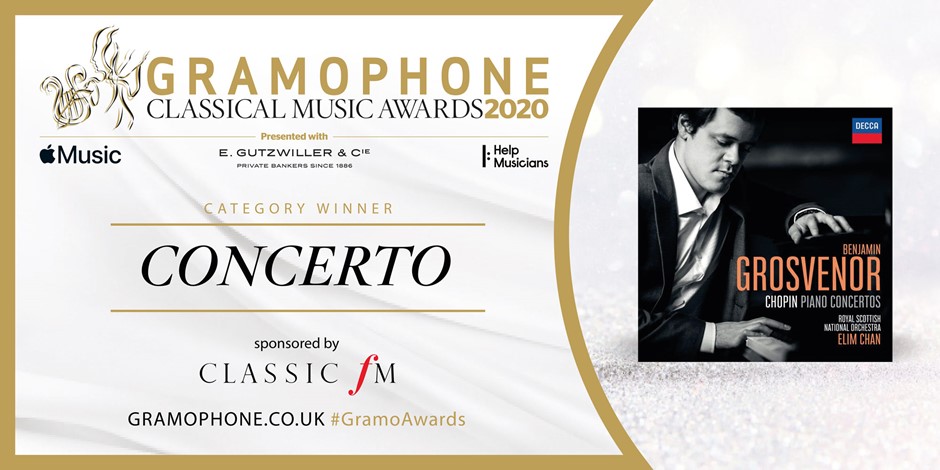Concerto


CHOPIN Piano Concertos
Benjamin Grosvenor; Royal Scottish National Orchestra / Elim Chan
(Decca)
The Gramophone Review
I haven’t been this struck by the orchestral expositions to Chopin’s concertos since Jun Märkl with the Scottish Chamber Orchestra for Ingrid Fliter. Now in the company of another Scottish orchestra, the RSNO, Elim Chan makes equally bold decisions about how the music should go. It’s easy to understand why they appointed her Principal Guest Conductor in 2018 after she’d stood in for an indisposed Neeme Järvi the previous year.
In the E minor First Concerto’s opening exposition the mere fact of having a symphony rather than chamber orchestra gives it a natural weight, and into the mix Elim Chan injects not only a passionate urgency but also a bounce to the rhythms. Suddenly you’re aware that this concerto comes out of a Beethovenian tradition, a quality emphasised in the lyrical second theme which here has a straightforwardly Classical underlying pulse, with none of the rubato that can over-romanticise it. The flute melody here is certainly not underpowered but it emerges naturally, and the brass are full of character. It’s all a world away from Zimerman’s dangerously drawn-out view of the movement. What’s also abundantly apparent throughout these performances is that the orchestral musicians are galvanised by Chan – not always a given in these concertos.
‘Grosvenor is a master of the sung line, and the way he deals with Chopin’s phantasmagoric ornamentation has a rare inevitability about it’
When Benjamin Grosvenor finally makes his first entrance, it proves well worth the wait, and his playing beguiles from the off; as the dynamics sink, his lines are full of poetry but they unfold with utter naturalness. Chan follows his every gesture unerringly – there’s no doubting the musical chemistry at play here. And that brings me to another point: Grosvenor has always balanced his solo career with chamber music-making and it really shows – just sample the way he duets so subtly with the bassoon (track 1, from 10'32"). But he’s not afraid to command the stage either – the upward scales in thirds and sixths (from 11'26") have a feisty brilliance to them. Even the points that can sound like mere passagework in some performances are lovingly brought alive, Grosvenor constantly recolouring the lines or reweighting the textures with endless imagination.
For the Romanze the strings set the tone with what sounds to be a minimal vibrato, and again the feeling is of glorified chamber music, the piano within the texture rather than dominating it. Grosvenor is a master of the sung line, and the way he deals with Chopin’s phantasmagoric ornamentation has a rare inevitability about it. The link to the finale (track 2, from 7'30") is particularly breathtaking, with each of the piano’s harmonic shifts sounding bell-like and crystalline; as the orchestra creeps back in, Grosvenor responds with phrases that are coloured with such variety that it’s as if we’re hearing them for the very first time.
The F minor Second Concerto is every bit as outstanding, with Grosvenor and Chan bringing out not only the work’s songfulness but also making us aware of the inner lines and Chopin’s contrapuntal thinking. In the opening movement, listen to the way he seems to have all the time in the world for the ornamentation of the lyrical second theme that was initially presented on woodwind (track 4, from 4'56"). It’s a reminder of the sheer delicacy of his playing, and the movement as a whole has many moments of sheerly luminous playing, its innate wistfulness beautifully brought out.
The heartfelt slow movement (inspired by the young Chopin’s unspoken love for Konstancja Gładkowska, his classmate at the Warsaw School of Music) is as ravishing as anyone’s, the tempo just right for Grosvenor to spin Chopin’s ever more extravagantly filigree lines with an apparently spontaneous ease, Chan responding unerringly to every dynamic shift. And how dramatic are the hushed string tremolos as the mood darkens (track 5, from 4'11").
After such tension, the finale comes as a delicious balance of extroversion with playfulness, Grosvenor’s virtuosity always at the service of the music, easing into the passage with col legno violins and violas (track 6, 2'08") with insouciant inevitability. On every hearing new details seem to emerge – the most delicate trilling here, a wonderful snippet of clarinet theme there – but always with a sense of storytelling, Chopin’s ever-shifting moods lustrously caught. The point where we move to the major (from 6'50") is gloriously uplifting, and the lyrical interjection just before the close again unerringly judged by all.
Benjamin Grosvenor has also been blessed with a very fine instrument and a fabulous recording. It’s the kind of disc that makes you rethink these works and appreciate them all over again. And let’s hope that this is the start of a wonderful recording partnership with Elim Chan.
(Harriet Smith, March 2020)
The Concerto Award is sponsored by Classic FM
Listen on Apple Music
— RECORDING CATEGORIES —
Chamber
Choral
Concerto
Contemporary
Early Music
Instrumental
Opera
Orchestral & Recording of the Year
Recital
Solo Vocal
— SPECIAL AWARDS —
Lifetime Achievement
Beethoven 250 Award
Artist of the Year
Special Achievement
Label of the Year
Young Artist of the Year
Orchestra of the Year
Concept Album

Gramophone Digital Club
- Digital Edition
- Digital Archive
- Reviews Database
- Full website access
From £8.75 / month
Subscribe
Gramophone Full Club
- Print Edition
- Digital Edition
- Digital Archive
- Reviews Database
- Full website access
From £11.00 / month
Subscribe
If you are a library, university or other organisation that would be interested in an institutional subscription to Gramophone please click here for further information.




